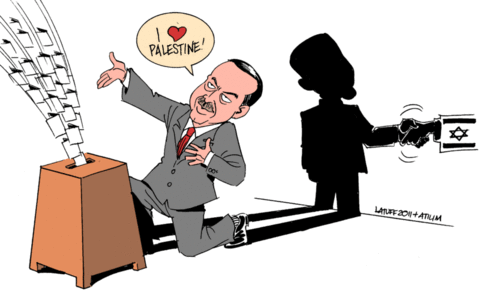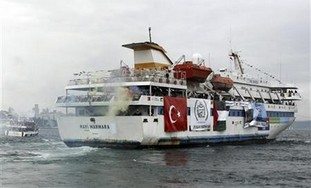Last June, as the Gaza Freedom Flotilla 2 was preparing its attempt to break the illegal Israeli siege of Gaza, many were dismayed when the Mavi Marmara was withdrawn from the flotilla. Why did this happen?
The Mavi Marmara is the Turkish-operated ship that Israel attacked on 31 May 2010 in international waters during the previous flotilla, killing 9 people and injuring dozens more.
Israel’s refusal to apologize for the attack, and to meet other Turkish demands led to yesterday’s unprecedented sanctions by the Turkish government.
In the wake of a deeply flawed, biased and non-credible UN report justifying the Israeli siege of Gaza and whitwashing the Israeli attack, Turkey has downgraded diplomatic relations with Israel to the lowest level, suspended all military agreements between the countries, and vowed to take other measures to seek justice for the victims of the Israeli attack and to challenge the Israeli siege.
Why did Turkey stop the Mavi Marmara?
 Carlos Latuff
Carlos LatuffAlthough the Mavi Marmara was operated by the independent charity IHH, it seems highly likely that the decision to withdraw from the flotilla in June was taken at the suggestion of the Turkish government. The reasons given publicly for withdrawing the ship were “technical.”
We cannot know what private communications may have taken place, but in early June Turkish Foreign Minister Ahmet Davutoğlu publicly suggested that the flotilla organizers should “rethink” their plan to break the siege by sea. Whether the decision was at the behest of the Turkish government or not, it suited its needs at the time. Why?
At the time many observers – myself included – feared that Turkey was softening its stance toward Israel and seeking to “mend fences” without Turkey’s demands being met.
The suspicions of many were encapsulated in a drawing by celebrated political cartoonist Carlos Latuff that showed Turkish Prime Minister Recep Tayyip Erdoğan declaring “I love Palestine” to win votes in the Turkish general election, while his shadow shakes hands with Israel.
Many were convinced that the withdrawal of the Mavi Marmara meant Turkey’s policy was no different from the abject complicity of Greece, which worked hand in glove with Israel, to prevent the remaining flotilla ships from reaching Gaza.
It is now clear that this analysis was wrong. For one thing, Turkish-Israel relations featured little in the June Turkish election campaign, and if Turkey’s stance was about winning votes, the government would presumably have announced its measures against Israel before the election rather than months afterwards.
A tactical move in a long strategy?
In light of the relative severity and decisiveness of Turkey’s sanctions on Israel, it is certain that withdrawing the Mavi Marmara was a tactical step, as negotiations between Israel and Turkey were ongoing, to avoid giving Israel the excuse of another “provocation” which would let it off the hook for the previous attack.
Sending the ship could also have led to unknown consequences from Turkey’s perspective: either allowing Israel to seize the ship again, or escalating into a military confrontation.
“Wasted opportunities”
In his uncompromising 2 September statement laying out the sanctions on Israel, Foreign Minister Davutoğlu said:
Turkey’s stance against this unlawful act of Israel from the first moment has been very clear and principled. Our demands are known.
Our relations with Israel will not be normalized until these conditions are met.
At this juncture, Israel has wasted all the opportunities it was presented with.
Now, the Government of Israel must face the consequences of its unlawful acts, which it considers above the law and are in full disregard of the conscience of humanity. The time has come for it to pay a price for its actions.
This price is, above all, deprivation of Turkey’s friendship.
Turkey’s gesture of stopping the Mavi Marmara from sailing in June is almost certainly one of the “wasted opportunities” to which Davutoğlu alluded. Another would have been Turkey’s assistance in extinguishing last’s year’s Carmel wildfire.
Laying the ground for a decisive step
By giving Israel all these opportunities and avoiding anything that Israel could present as a provocation, Turkey has established beyond any reasonable doubt Israel’s total intransigence and unwillingness to assume responsibility.
Thus, the measures taken yesterday by Turkey appear to have been well-studied and carefully prepared. This suggests that Davutoğlu was serious when he said there would be no retreat from Turkey’s position and no normalization of relations until Turkey’s demands are met.
The cost to Turkey?
One calculation Turkey certainly would have had time to consider is the price it might pay in terms of retaliation from the United States, Israel’s protector and patron. Turkey, unlike Israel, is a formal ally of the United States, a member of NATO, and thus has a mutual defense pact with the United States.
The Turkish government must have concluded that it can withstand whatever wrath the United States might mete out, especially since the US still feels it needs Turkey to help maintain its faltering hegemony in the region.
On the same day it announced sanctions on Israel, Turkey also revealed that it had reached agreement to host radar installations as part of the American-sponsored and conceived NATO “missile defense” program.
Press reports indicate that as part of the deal, the US acceeded to a Turkish demand that data from the Turkish-hosted radars not be shared with Israel.
Turkey, it turns out, is still of more practical benefit to US regional hegemony than Israel, which is increasingly a strategic and political burden to the United States.
In terms of regional implications, Turkey has demonstrated to supine Arab regimes, particularly Egypt’s ruling military junta, that imposing a cost for Israel’s aggression is an option despite US support.
Will the Mavi Marmara sail to Gaza again?
Now that Turkey has shown its hand toward Israel, the question arises: will the Mavi Marmara sail to Gaza again? That is a question I cannot answer, but Davutoğlu also made clear that Turkey does not recognize the siege or maritime blockade of Gaza and would continue to challenge it:
As a littoral state which has the longest coastline in the Eastern Mediterranean, Turkey will take whatever measures it deems necessary in order to ensure the freedom of navigation in the Eastern Mediterranean.
Turkey does not recognize the blockade imposed on Gaza by Israel. Turkey will ensure the examination by the International Court of Justice of Israel’s blockade imposed on Gaza as of 31 May 2010. To this end we are starting initiatives in order to mobilize the UN General Assembly.
What these measures will mean in practice – and whether they will involve the Mavi Marmara returning to Gaza, remains to be seen.





